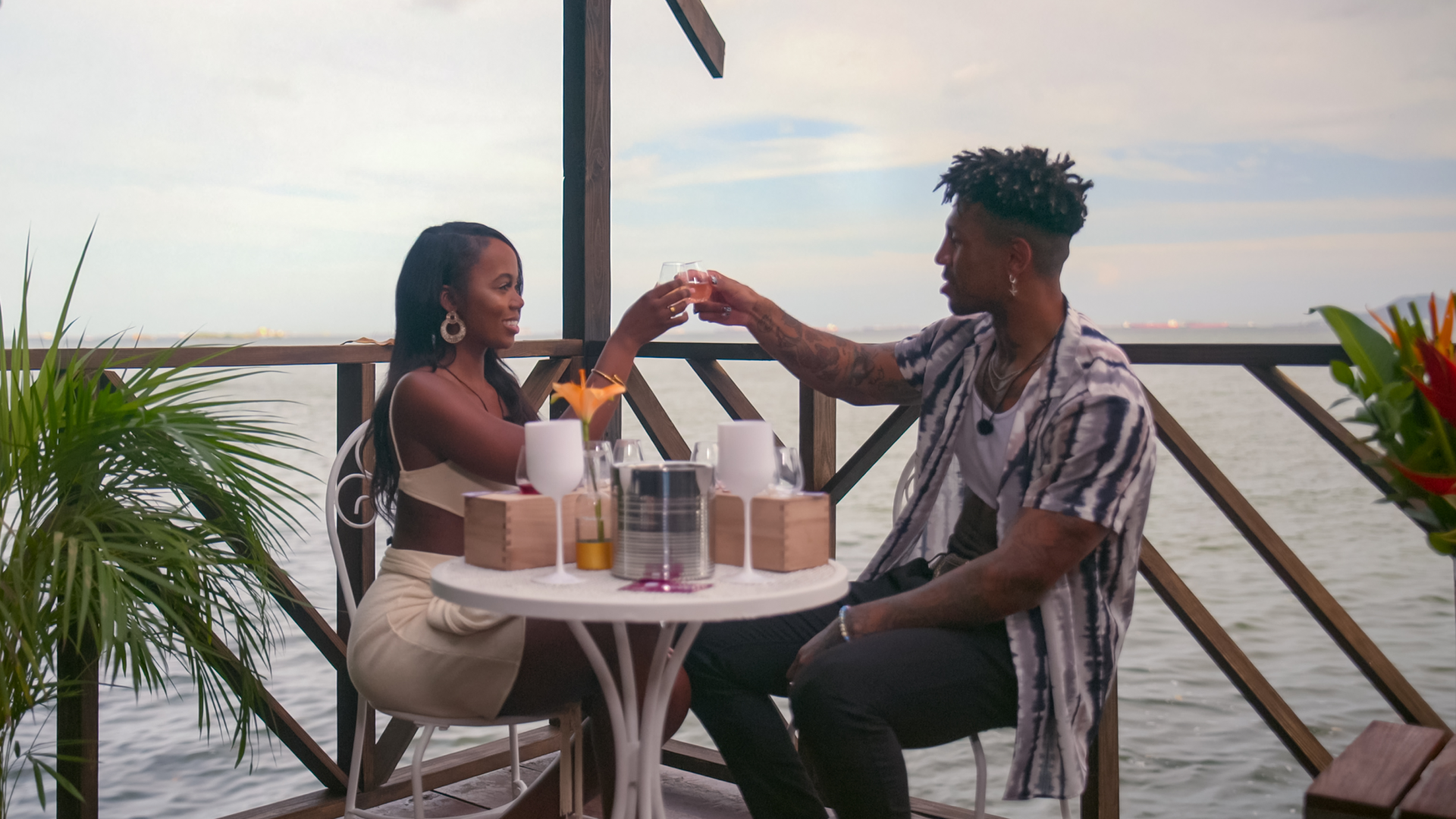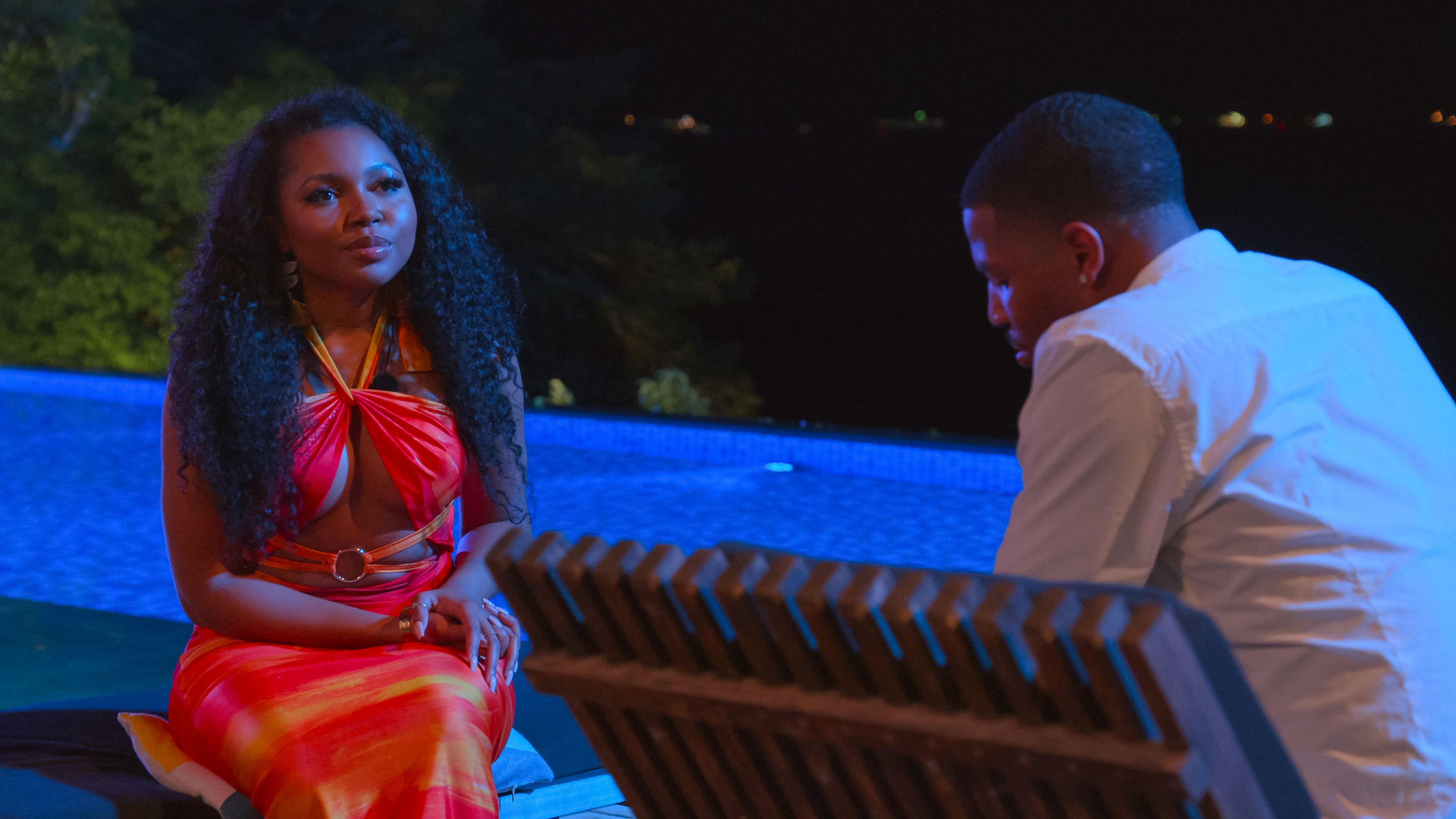Strong Black Women Never Had a Chance on 'Perfect Match'
Netflix’s answer to 'Love in Paradise' is a stark example of reality TV’s racial blindspot.

When Dom Gabriel is matched with Colony Reeves in episode 5 of the Netflix reality series Perfect Match, the pairing seems doomed from the start. Gabriel has been set up on a date with Reeves in the streaming giant’s answer to Bachelor in Paradise, even though he’s interested in exploring his connection with Georgia Hassarati. He is honest and respectful with Reeves as he explains that he’s taken and encourages her to explore other connections in the house. Later that night, when he’s (fruitlessly) trying to play wingman to her for Bartise Bowden, he calls Reeves “amazing” and “gorgeous” and a “strong Black woman [who] works for herself.” It’s a seemingly sweet gesture but as someone who’s been “complimented” with the phrase "strong Black woman" before, I was left rolling my eyes.
When the meme “Strong Black Woman Who Don’t Need No Man” rose to ubiquity in the early 2010s, I was in high school. It was my senior year and I had a hopeless crush on one of my best male friends. I began to drop hints to him that I wanted a boyfriend, before admitting I really wanted him as my boyfriend. I barely remember the context of the Facebook chat where I first brought up my desire for love, but my crush’s response is forever lodged in my brain: “But you’re a strong black woman who don’t need no man.” I felt totally othered when I read those words, like he could never like me because I was Black—that my Blackness served as some kind of barrier to his romantic attention. But, it still sounded like a good thing. Didn’t I want to be perceived as strong? That was my first, very-early encounter with the uncomfortable truth behind that phrase: that the “Strong Black Woman” trope is often more dehumanizing than praiseful.
I felt a familiar echo of that othering feeling while watching Gabriel describe Reeves with that term, and several times again in the show when the Black women were called words that have come to be synonymous with it: ”boss,” “hard-working,” “queen.” From a quick scroll on Twitter or Reddit, it’s clear that I and countless other Black female viewers had similar issues with those moments, since those descriptors typically came right before the male contestants made it known that they weren’t interested in these women romantically. Reeves herself and her fellow contestant Anne Sophie Petit-Frere recently even published a TikTok where they made it clear that they don’t identify or appreciate being aligned with the trope that has become all too common on reality shows.
As I watched the journeys of Reeves, Petit-Frere, Izzy Faithorne, and Diamond Jack on Perfect Match, it was harder to connect to their storylines than those of the show’s other female contestants. Throughout the episodes, each of the four Black women were presented more as supporting characters than main stars or integral romantic partners. Even in the scenes when they were involved in big dramatic events, viewers weren’t given their thoughts on what happened. Consider Petit-Frere’s match with Chase DeMoor over the course of episodes 2 and 3, which included their false win after manipulating the blind kiss scores. Why wasn’t there a confessional on how she felt about manipulating the blind-kiss scores, or a scene of her response to DeMoor setting himself up with Hassarati? Without hearing her side of the story, Petit-Frere comes across like a pawn to DeMoor’s gameplay rather than an equal in their on-screen partnership.

Anne-Sophie Petit-Frere and Zay Wilson have a conversation in episode 2.
It was also particularly discomforting to see how Reeves and Jack were introduced onto the show: by being set up on dates with Gabriel. It was clear to me while watching that both Reeves and Jack weren’t necessarily the best match for him personality-wise, but the couples in charge of the Board Room paired them anyway. This was made clear in episode 7, when Ines Tazi notes that Gabriel and Jack have very different personalities before Richardson matches them anyway without explaining his reasoning (at least, on camera). I felt the same in a later pairing, when Jack was set up with Bowden. Those scenes reminded me of when my well-meaning white friends would try to set me up with Black men they knew, without thoroughly thinking about my actual compatibility with him—because we would “look so good together.”
Not to mention, in episode 6, Reeves and Fairthorne are eliminated from the villa and their exit song features lyrics like “I’m an outcast.” Then in episode 9, when Jack struts out of the house with confidence—an overall empowering moment—the scene is interrupted by Gabriel shouting, “Yes, queen, know your worth.” With all of these moments, as well as the four Black women’s shorter tenure on the show, viewers of color were left with a bad taste in their mouths. It's proof yet again that reality dating show formulas ensure that strong Black women finish last.

Diamond Jack and Dom Gabriel pictured together during a scene from episode 8.
While Perfect Match has ignited this conversation since its premiere, the matter of how Black women have been misrepresented on reality dating shows—bringing into focus the question of if they should continue to participate and trust in a broken system—has been around since the days of The Bachelor’s TV dominance. It’s also a widely-shared statistic that Black women are the least desired demographic on dating apps, and shows like the Bachelor franchise and Love Island proved that disheartening phenomenon time and time again, when the Black female contestants were often rejected and eliminated early in their runs.
It's only time until Perfect Match is renewed for a second season, but I hope Netflix reconsiders its process for casting and editing to do better by Black women. Casting more people who have previous experience dating Black women could do wonders to move the needle for people of color on dating shows. But as it stands, it’s clear the show is providing its Black female viewers with an approach to diversity that isn't resonating, and I think that both the viewers, and the contestants, deserve more.
Get exclusive access to fashion and beauty trends, hot-off-the-press celebrity news, and more.
Quinci LeGardye is a Culture Writer at Marie Claire. She currently lives in her hometown of Los Angeles after periods living in NYC and Albuquerque, where she earned a Bachelor’s degree in English and Psychology from The University of New Mexico. In 2021, she joined Marie Claire as a contributor, becoming a full-time writer for the brand in 2024. She contributes day-to-day-content covering television, movies, books, and pop culture in general. She has also written features, profiles, recaps, personal essays, and cultural criticism for outlets including Harper’s Bazaar, Elle, HuffPost, Teen Vogue, Vulture, The A.V. Club, Catapult, and others. When she isn't writing or checking Twitter way too often, you can find her watching the latest K-drama, or giving a concert performance in her car.